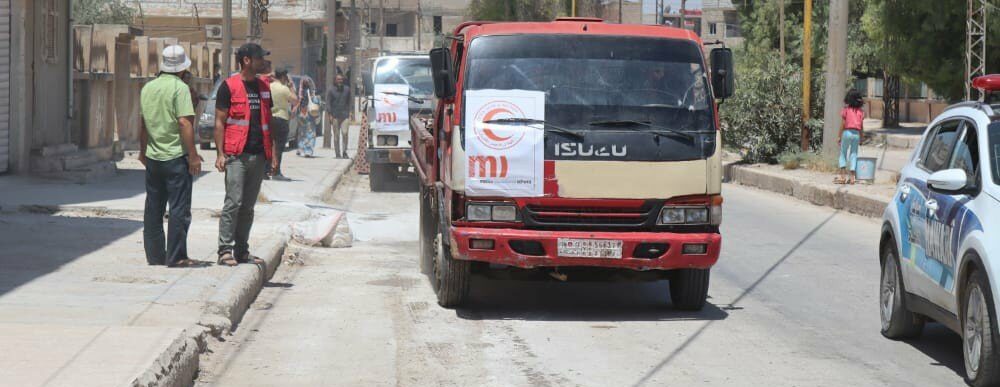Sara Montinaro, project manager at Kurdish Red Crescent, explains the water situation in Heseke after the latest cut-off of Allouk water station which is under Turkish occupation. She was interviewed on 11 July 2020.
We are here to face an emergency related to drinking water distribution. There is a huge crisis. After two days of shutdown, the pumping station started to work a bit, but not enough to reach all the area. Until now, we can say that 65% of Heseke city is totally without water.
You have to know that before the cut off of the water, there was already a shortage in the city. So now the situation is really complicated and the people are desperate.
We are in desperate conditions. We are in the middle of the summer, it is 45°C. Cutting water to the civilian population is a clear violation of international humanitarian law and, according to the Rome Statutes, signed also by Turkey, cutting water during an armed conflict is a crime against humanity. Moreover, cutting drinking water in the middle of a pandemic, when people are deprived of hygiene is even worse. The threat of coronavirus is an enormous risk for communities.
You have to know that since Turkey’s “Peace Spring Operation”, in October 2019, the Alouk pumping station, under Turkish control, has regularly been cut off. This is the 6th time in 10 months. The last time was in March this year. İn spite of statements and calls from UNICEF for Turkey to stop the cuts to the water-flow, they didn’t stop.
Allouk’s pumping station usually serves more than 700,000 people across the whole of Heseke region. Now Turkey is using only 3 of 10 pumps and only for a few hours each day. So the quantity of water is even not enough to cover Tel Tamer [a small town north-west of Heseke. Allouk water station is supposed to deliver water to major settlements including Tel Tamer, Amude, Heseke, Hol, Hol Camp, Tel Kocher, Shedadi].

There is also an electricity problem because the dams [on the Euphrates river] are not working properly, because there is not enough water pressure. [This is because] Turkey is also pumping water from the river. So the water level is reducing on the one hand, and on the other, they closed Allouk station.
In order to set up and cover the people needs, there is huge cooperation and coordination between different actors in the field. So the Water Department of the city, with the Council of the Municipality, including the heads of the local communes, and local and international NGOs are constantly following and updating the situation. And we try to cover wherever there is a need and there are gaps to cover. There are several challenges we are facing and different factors to consider, such as the supplier’s capacity, which depends on limited water sources and is affected by excessive demand at the source.
It is not simple, not at all. With all possible efforts, we are trying to supply water. The real problem is for our people, who really need water. We are trying to do our best but unfortunately, it is not enough. However, we will continue, of course.
We need to find a long term solution. Due to the security crisis caused by Turkey’s attacks on the region, we are not able to organize it.
What is going now right here is a huge crime. For now, we are still lucky that there has been no Coronavirus outbreak [in North and East Syria]. But when COVID-19 does arrive, these cuts in the water supply will kill people. We are aware of the Coronavirus spreading in neighboring states.
The Turkish Government has to stop this behaviour. We strongly ask all actors and Western countries to express their position, and to make pressure on Turkey, a NATO ally, to respect fundamental rights and follow the principles and rules of international humanitarian law.
In this framework the UN Council has again decided to keep the the Yarubia border crossing closed, which is fundamental for bringing humanitarian aid into the region [but has been closed for the past 6 months under Russia pressure, meaning no UN aid is arriving into North and East Syria, but all routed via the Syrian regime in Damascus].


